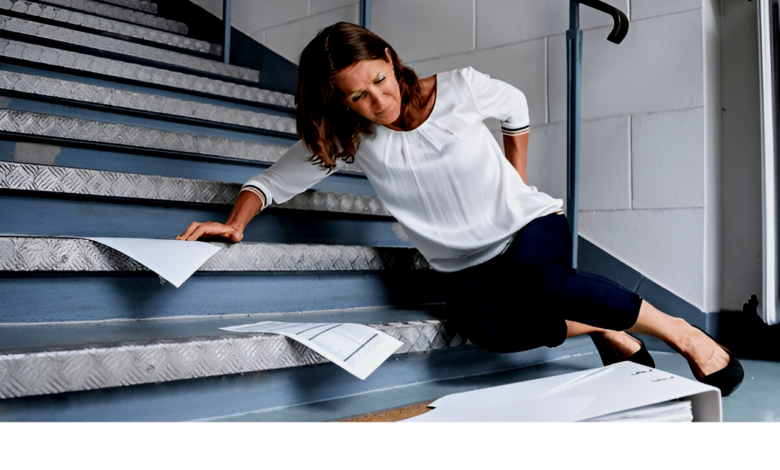Slip and Fall Injury Lawsuits in Pennsylvania Legal Steps to Take
Slip and fall injury lawsuits in Pennsylvania require prompt action. Learn key legal steps to prove negligence and secure compensation for your injuries.

Slip and fall accidents are among the most common and often preventable causes of serious injuries in Pennsylvania. Whether due to wet floors, uneven pavement, icy walkways, or poor lighting, these incidents can lead to broken bones, head trauma, spinal Slip and Fall Injury, and long-term disabilities. If you’ve been injured in a slip and fall accident caused by a property owner’s negligence, you may be entitled to compensation for medical expenses, lost wages, and pain and suffering. However, securing fair compensation requires understanding Pennsylvania’s premises liability laws and taking the right legal steps Slip and Fall Injury.
Navigating a slip and fall claim can be complex, especially when dealing with insurance companies that may try to minimize or deny your claim. From documenting the accident scene to proving negligence and negotiating a settlement, each step plays a crucial role in building a strong case. This guide outlines the key legal actions you should take after a slip and fall injury in Pennsylvania, helping you protect your rights and maximize your chances of a successful outcome. Whether you’re considering filing a lawsuit or exploring a settlement, knowing your legal options is the first step toward justice and financial recovery.
Slip and Fall Injury Lawsuits in Pennsylvania Legal Steps to Take
The Legal Framework of Premises Liability
Pennsylvania’s premises liability law establishes that property owners/occupiers must exercise reasonable care to protect visitors from foreseeable harm. The critical legal elements include Duty of care The level of responsibility varies by visitor classification. Businesses owe the highest duty to customers (invitees), requiring regular safety inspections and prompt hazard remediation. For residential properties, homeowners must warn social guests (licensees) of known dangers. Notice requirements For government property claims, special rules apply including strict 6-month notice deadlines to municipalities under the Political Subdivision Tort Claims Act.
Determining Factors for Claim Valuation
Multiple evidentiary and situational factors influence case outcomes Documentation timeline The first 72 hours are crucial. Photos of the hazard (with timestamps), Slip and Fall Injury medical reports linking injuries to the fall, and witness statements carry maximum evidentiary weight. Comparative negligence defenses: Pennsylvania’s 51% rule creates settlement leverage. Insurers often argue victims were distracted (e.g., phone use) or wearing improper footwear. Strong cases demonstrate the owner’s actual knowledge like prior incident reports or maintenance logs showing repeated issues.
Immediate Steps to Take After a Slip and Fall Accident
The moments following a slip and fall accident are critical. First, seek medical attention, even if your injuries seem minor, as some symptoms may appear Slip and Fall Injury. Report the incident to the property owner or manager and ensure an official report is filed. Collect evidence by taking photos of the hazardous condition, your injuries, and the surrounding area. Obtain contact information from any witnesses, as their testimony can strengthen your case. Avoid discussing fault or making statements to insurance adjusters without consulting a lawyer.
Pennsylvania’s Comparative Negligence Rule
Pennsylvania follows a modified comparative negligence rule, meaning your compensation may be reduced if you are found partially at fault. For example, if you were texting while walking and didn’t notice a wet floor sign, a court may assign you 20% fault, reducing your Slip and Fall Injury by that percentage. However, if you are deemed 51% or more at fault, you may be barred from recovering any damages. An experienced attorney can help minimize allegations of shared fault.
Proving Liability in a Slip and Fall Case
The Four Pillars of a Strong Slip and Fall Case
To build a winning premises liability claim in Pennsylvania, you must methodically establish each legal element Duty of Care Property owners must maintain safe conditions appropriate to your visitor status. Businesses owe the highest duty to customers (regular hazard Slip and Fall Injury, prompt cleanup), while homeowners must warn social guests of known dangers. The duty varies for trespassers, except in cases involving attractive nuisances that could harm children. Breach of Duty: Prove the owner failed their obligation by showing Actual knowledge (e.g., an employee saw the spill but didn’t clean it).
Building an Ironclad Evidence Portfolio
A compelling case requires multiple evidence streams Digital Evidence Surveillance footage (request preservation immediately businesses often overwrite tapes). Timestamped photos of the hazard showing its severity and lack of warnings. Smartphone data (location history proving when/where you fell). Paper Trail Maintenance logs exposing inspection gaps (obtained through discovery). Incident reports you filed at the scene (get copies before they’re “lost”). Prior complaints about the same hazard (check municipal records for businesses).
Statute of Limitations for Slip and Fall Claims in Pennsylvania
In Pennsylvania, slip and fall victims generally have two years from the date of the accident to file a lawsuit. Missing this deadline can result in losing your right to compensation. Exceptions may apply for minors or cases involving government properties, where notice must be filed within six months. Consulting a lawyer promptly ensures all deadlines are met and your claim is filed Slip and Fall Injury.
Settlements vs. Trial in Slip and Fall Cases
Most slip and fall cases settle out of court through negotiations with the property owner’s insurance company. Settlements offer faster resolution and Slip and Fall Injury compensation, but insurers often try to minimize payouts. If a fair settlement cannot be reached, your case may proceed to trial, where a judge or jury will determine liability and damages. An attorney can advise whether accepting a settlement or going to trial is in your best interest.
How a Pennsylvania Slip and Fall Lawyer Can Help
Navigating a slip and fall claim alone can be overwhelming, especially when dealing with injuries. A knowledgeable attorney can handle communications with insurers, gather evidence, and negotiate on your behalf. They can also assess the full value of your Slip and Fall Injury, including future medical expenses and lost earning capacity. Hiring a lawyer significantly increases your chances of obtaining maximum compensation.
Read More: Healthcare Fraud: Detecting, Reporting, and Preventing
Conclusion
Slip and fall accidents can have life-altering consequences, leaving victims with mounting medical bills, lost income, and prolonged pain and suffering. If your injury was caused by a property owner’s negligence, pursuing a slip and fall injury lawsuit in Pennsylvania may be necessary to secure the compensation you deserve. By taking immediate action such as seeking medical attention, preserving evidence, and consulting an experienced personal injury attorney you strengthen your case and improve your chances of a favorable outcome. Remember, Pennsylvania’s strict deadlines and comparative negligence laws make it essential to act quickly and strategically.
While no amount of money can undo the physical and emotional toll of an accident, a successful slip and fall injury lawsuit in Pennsylvania can provide critical financial relief and hold negligent parties accountable. Whether through settlement negotiations or trial litigation, having skilled legal representation ensures your rights are protected every step of the way. If you or a loved one has suffered a slip and fall injury, don’t wait contact a qualified attorney today to discuss your case and explore your legal options for recovery.
FAQs
What should I do immediately after a slip and fall accident?
Seek medical attention, report the Slip and Fall Injury, document the scene, collect witness information, and consult a lawyer before speaking with insurers.
How long do I have to file a slip and fall lawsuit in Pennsylvania?
The statute of limitations is generally two years, but exceptions may apply for government properties or minors.
Can I still recover damages if I was partially at fault?
Yes, Pennsylvania’s comparative negligence rule allows recovery if you are less than 51% at fault, but your compensation will be reduced.
What damages can I claim in a slip and fall case?
You may seek compensation for medical bills, lost Slip and Fall Injury, pain and suffering, and future rehabilitation costs.
Do I need a lawyer for a slip and fall claim?
While not required, an attorney can maximize your compensation by handling negotiations, evidence collection, and legal filings.











